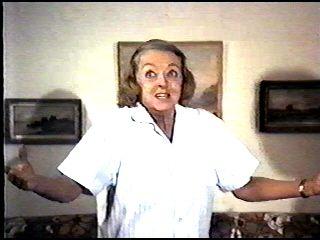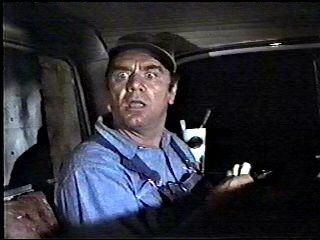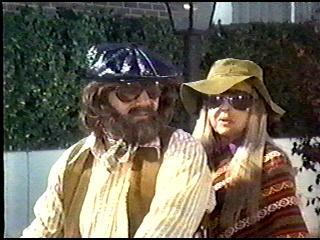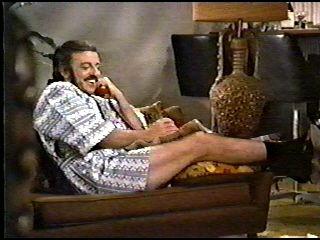
|
|
|
|
|
|
|
|
|
|
|
|
|
(1972) Director: Gerd
Oswald
The bizarre premise alone will get many people interested in Bunny O'Hare. The fact that the two people who star in the movie are former Oscar-winners will raise the interest level of many people who stumble across it. And when you add the additional fact that those two Oscar winners happen to be Bette Davis and Ernest Borgnine... well, for the average movie buff the movie appears to be one of those "absolutely gotta see" kind of movies. Yet at the same time those buffs will probably cannot help but wonder at the same time why Bunny O'Hare, with a plot so unconventional and with stars so well known agreeing to star in something so different from what they are used to, isn't known very well by many people. The answer to that puzzle will no doubt come to those buffs when they actually get to watch the movie, even before they get to the closing credits. As you've probably guessed, the reason why the offbeat (to say the least) Bunny O'Hare isn't well know is for the simple fact that's it's not very good (to say the least). It is essentially a one-joke movie where even the one joke isn't told very well, either the first or the many subsequent times it's repeated. This was one of the biggest embarrassments for the legendary American-International Pictures company, with even their usually loyal drive-in audience rejecting it, which probably explains why it was subsequently all but buried by AIP and the subsequent companies that took possession of its film library. Watching the movie today, one will probably wonder why
AIP thought this movie would work. In fact, twenty years after the
movie Though you can't help but wonder for a little while what were the many changes Davis demanded and got, as well as how the movie would have been like if it had been filmed with its originally intended treatment, one soon realizes the fruitlessness of doing so. That's because even then the basic idea behind the movie still seems to scream "cute", instead of promising something - action, comedy, or whatever - of more substance. Davis plays the title figure, an aged (and weathered) widow living alone in Albuquerque, her two grown children (one of them played by Evil Roy Slade's John Astin, who also gets the credit of "Creative Consultant) long moved out but still highly dependent on her in a financial sense. Though when the movie begins, O'Hare suddenly has a big problem of her own - the Bank Of New Mexico, for reasons made very unclear, have seized her house, and thrown her out on the street, bulldozing the house in front of her eyes. Homeless, she throws herself onto the person nearest to her, William Gruenwald (Borgnine), a toilet repossessor who makes a living selling to Mexicans the used bowls he seizes. (Ha! Toilets! I bet you're laughing already.) Guilt-tripping William, O'Hare tags along with him in
his camper on his journey to Mexico, along the way accidentally
stumbling across his big secret - he's a retired I'll put aside the obvious inanity of the script for the time being, and I'll now get to the part of Bunny O'Hare than I'm sure people are most curious about - Bette Davis. Before I get into her performance, I must confess that I have never particularly liked Bette Davis. Sure, I acknowledge that she received a good amount of acclaim for her acting during her career, but I've personally found something about her that always gets under my skin and annoys me greatly. Even in her younger days, she always seemed to have a grating sneer on her lips and what seemed to be a feeling of contempt for everyone around her. There were also plenty of times when she thoroughly embarrassed herself by refusing to hold things back in her performance (I am still trying to shake the trauma of witnessing her prolonged death scene in Burnt Offerings). Anyway, it's kind of hard to judge Davis' performance in Bunny O'Hare, because, despite the title and the description of the movie, her character actually isn't given that much to do. For one thing, an extraordinary amount of the movie is in fact wasted on Cassidy's arrogant and totally unfunny pompous police bumbling around with his sexy female assistant, which is right out of the old, "Good idea, I glad I thought of it myself!" routine, which was ancient even when Daffy Duck and Porky Pig did it (and, I must add, still successfully.) The times when Davis is onscreen and gets a chance to do
something, she hardly registers on the radar. Though she embarrasses
herself in her first scene with her wide-eyed looking around, her
performance afterwards In fact, it's Borgnine who saves this movie from being a total disaster. Though he's played plenty of tough characters in his career, there's always been a kind of jovial spirit surrounding Borgnine that makes you instantly like him no matter how despicable whatever character he plays. Despite this clownish side to him, it's strange that (aside from working in television) Borgnine has never been cast in that many comedies. Despite the overall awful nature of Bunny O'Hare, it must be admitted that it does give Borgnine a chance to show how funny he can be. With both his bulging eyes and slack-jaw mouth, his expressions of shock and surprise are always a hoot to behold. He also puts the right amount of exaggeration in his voice when his character gets defensive or devious, and the slightly clownish tone that results from this makes what he's saying or doing funnier than how it would be otherwise. Ultimately, it's not surprising that he ends up doing more for the movie than the movie does for him; it doesn't take long for him to ultimately have nothing to do except join in Davis' humiliation when they are made to wear hippie wigs and rags. With Borgnine's character having as very little
personality as Davis's character has, nothing is generated when they
interact with each other; the two of them have Actually, when that particular goof occurred, I wasn't really that surprised at all; by then, I had become accustomed to the movie's slipshod construction. Reflections of boom mikes are visible, a telephone lets out just one microsecond "ting!", a collision between two police motorcycles is heard but not actually seen, and tires screech on dirt roads. The outside of one bank looks like a worn-down tattoo parlor, and another looks like a T.G.I. Friday's with a "Bank Of New Mexico" sign hastily slapped up. It's clear director Gerd Oswald is absolutely helpless with this material he's working with, whether it be of a more comic or action-oriented vein. Many scenes seem to start in midstream, or end before they seemingly get to where they were headed. More complete setpieces, like a "hilarious" motorized chase through a shopping center pre-Blues Brothers, come across in the most labored and dull manner you can possible imagine. One cannot help but wonder why Davis personally hand-picked such a seemingly incapable director to helm this project, until you have the knowledge that Davis had Oswald completed cowed and managed to "convince" him to implement her numerous on-set suggestions. In fact, when you consider how much influence Davis had on the creation of this movie, you could say she herself directed Bunny O'Hare, and the results are her "vision" - and for me, this vision is the one thing about Davis that I find even more creepy that seeing her sneery expression. Check
for availability on Amazon. See also: Find The Lady, Good Times, Real Men |
 was made, former AIP
head Samuel Z. Arkoff in his autobiography Flying Through Hollywood
By The Seat Of My Pants was still wondering the same thing.
Arkoff spent several pages detailing the sorry history of the movie,
revealing how Bette Davis almost from the beginning started to make
problems for the production. This included her reviving her well-known
habit of suddenly demanding changes to the script once filming started,
despite having previously agreeing to do the project as it originally
was. Needless to say, her demands (many of which she ultimately got)
caused havoc and misery among the crew and other actors on the set, and
these problems inevitably trickled back to AIP itself. The biggest
problem ultimately came in shooting the final sequence, where her
character uttered the last words in the screenplay, "Screw 'em!" Davis
was adamant that her character would actually be saying a stronger
synonym for the first word of that statement, one that would instantly
destroy any chance of the movie getting a PG rating. AIP did finally
let her get her way... though in post-production they hired someone to
overdub Davis' two-word statement to how it was originally scripted.
Though when the movie was ultimately released and Davis saw it, she
caused further problems for AIP by filing a multi-million dollar
lawsuit against them for supposedly "transforming" the movie into
something completely different than intended. (The suit was later
dropped.)
was made, former AIP
head Samuel Z. Arkoff in his autobiography Flying Through Hollywood
By The Seat Of My Pants was still wondering the same thing.
Arkoff spent several pages detailing the sorry history of the movie,
revealing how Bette Davis almost from the beginning started to make
problems for the production. This included her reviving her well-known
habit of suddenly demanding changes to the script once filming started,
despite having previously agreeing to do the project as it originally
was. Needless to say, her demands (many of which she ultimately got)
caused havoc and misery among the crew and other actors on the set, and
these problems inevitably trickled back to AIP itself. The biggest
problem ultimately came in shooting the final sequence, where her
character uttered the last words in the screenplay, "Screw 'em!" Davis
was adamant that her character would actually be saying a stronger
synonym for the first word of that statement, one that would instantly
destroy any chance of the movie getting a PG rating. AIP did finally
let her get her way... though in post-production they hired someone to
overdub Davis' two-word statement to how it was originally scripted.
Though when the movie was ultimately released and Davis saw it, she
caused further problems for AIP by filing a multi-million dollar
lawsuit against them for supposedly "transforming" the movie into
something completely different than intended. (The suit was later
dropped.) bank robber still on
the run from the authorities. Using her newly-gained knowledge, she
blackmails William to try and get him to accept her repeated request:
Train her to rob banks so she can hold up one of the branches of the
New Mexico bank as an act of revenge. Reluctantly he agrees,
subsequently trains her in the tricks of the trade as well as how to
ride a motorcycle, and actually ends up participating in the robbery
himself when his conscious gets the better of him. The robbery and
escape are a complete success, though O'Hare's conscious won't let her
quit and resume the trip to Mexico. O'Hare is extremely worried about
the precarious state her children are in - her son having massed
massive debts, and her daughter's husband needing therapy after being
severely mentally scarred after being fired for asking for a raise
after spending four years straight doing the mentally anguishing task
of cutting liver in a butcher shop. (No, I am not going to repeat all
of that.) All of which needs money, much more than O'Hare has now, so
she pushes William into helping her achieve this. Disguising themselves
as hippies (!) and racing around on William's motorbike, they start
their own crime spree, robbing one bank after another. Naturally, this
does not escape notice of the authorities, and one police detective
(Jack Cassidy) is particularly determined to catch them.
bank robber still on
the run from the authorities. Using her newly-gained knowledge, she
blackmails William to try and get him to accept her repeated request:
Train her to rob banks so she can hold up one of the branches of the
New Mexico bank as an act of revenge. Reluctantly he agrees,
subsequently trains her in the tricks of the trade as well as how to
ride a motorcycle, and actually ends up participating in the robbery
himself when his conscious gets the better of him. The robbery and
escape are a complete success, though O'Hare's conscious won't let her
quit and resume the trip to Mexico. O'Hare is extremely worried about
the precarious state her children are in - her son having massed
massive debts, and her daughter's husband needing therapy after being
severely mentally scarred after being fired for asking for a raise
after spending four years straight doing the mentally anguishing task
of cutting liver in a butcher shop. (No, I am not going to repeat all
of that.) All of which needs money, much more than O'Hare has now, so
she pushes William into helping her achieve this. Disguising themselves
as hippies (!) and racing around on William's motorbike, they start
their own crime spree, robbing one bank after another. Naturally, this
does not escape notice of the authorities, and one police detective
(Jack Cassidy) is particularly determined to catch them. calms down... and down some more... until she
is hardly saying a word at all. She then seems content to make the
other characters and slow-moving story push her character around,
instead of having her character do some pushing to change whoever and
whatever is going around her. Another problem I had with Davis was with
her physical appearance. While it may smack of something like
chauvinism on my part, I have to admit I never found her that
good-looking, even early in her career. In Bunny O'Hare she
looks twenty years older than the age she actually was (63) when the
movie was made. She looks very tired, apparently enough that she didn't
have the energy to spend much time maintaining herself, covering her
famous Bette Davis eyes with dark glasses for most of the movie, and
sporting flat and dishevelled greasy-looking grey hair. The parts of
her role that consist of physically demanding acts like running around
are clearly agony for her, and even I felt some sympathy seeing her
humiliated in this fashion. Just how bad does she appear? Well, if you
look at how the now 85 year-old Ernest Borgnine comes across today,
even he is much more energetic now than how Davis here is (and better
looking.)
calms down... and down some more... until she
is hardly saying a word at all. She then seems content to make the
other characters and slow-moving story push her character around,
instead of having her character do some pushing to change whoever and
whatever is going around her. Another problem I had with Davis was with
her physical appearance. While it may smack of something like
chauvinism on my part, I have to admit I never found her that
good-looking, even early in her career. In Bunny O'Hare she
looks twenty years older than the age she actually was (63) when the
movie was made. She looks very tired, apparently enough that she didn't
have the energy to spend much time maintaining herself, covering her
famous Bette Davis eyes with dark glasses for most of the movie, and
sporting flat and dishevelled greasy-looking grey hair. The parts of
her role that consist of physically demanding acts like running around
are clearly agony for her, and even I felt some sympathy seeing her
humiliated in this fashion. Just how bad does she appear? Well, if you
look at how the now 85 year-old Ernest Borgnine comes across today,
even he is much more energetic now than how Davis here is (and better
looking.) absolutely no chemistry, and come
across as two people who just met each other seconds earlier. The
screenplay does start some attempts to get these oddball characters
closer together; one scene has them preparing for a date together, and
a later scene has Borgnine tending to a hurt Davis after a bank robbery
goes wrong. But then these scenes abruptly end, and both characters go
by as if none of these things ever happened. The screenplay is a mess,
filled with missed comic opportunities such as when Borgnine smokes pot
for the first time (he ends up coughing very hard - har har), as well
as any insight, satiric or otherwise, to the hippie lifestyle this
elderly couple find themselves getting entwined in. The movie is
content just to present these long-haired youths as the most obvious
stereotypes, spouting out statements like, "Violence is the only way!"
(though later on these same radicals use the technique of passive
resistance by lying down in the middle of the highway.) The quality of
the writing in this screenplay even gets worse than this at times. For
example, not long after the crime spree has begun, Cassidy is reading
out loud the biography of the personal assistant he's about to get,
uttering the word "her" at one point. Yet when the personal assistant
comes in, he expresses shock that the assistant he's been assigned has
turned out to - gasp! - be a woman.
absolutely no chemistry, and come
across as two people who just met each other seconds earlier. The
screenplay does start some attempts to get these oddball characters
closer together; one scene has them preparing for a date together, and
a later scene has Borgnine tending to a hurt Davis after a bank robbery
goes wrong. But then these scenes abruptly end, and both characters go
by as if none of these things ever happened. The screenplay is a mess,
filled with missed comic opportunities such as when Borgnine smokes pot
for the first time (he ends up coughing very hard - har har), as well
as any insight, satiric or otherwise, to the hippie lifestyle this
elderly couple find themselves getting entwined in. The movie is
content just to present these long-haired youths as the most obvious
stereotypes, spouting out statements like, "Violence is the only way!"
(though later on these same radicals use the technique of passive
resistance by lying down in the middle of the highway.) The quality of
the writing in this screenplay even gets worse than this at times. For
example, not long after the crime spree has begun, Cassidy is reading
out loud the biography of the personal assistant he's about to get,
uttering the word "her" at one point. Yet when the personal assistant
comes in, he expresses shock that the assistant he's been assigned has
turned out to - gasp! - be a woman.